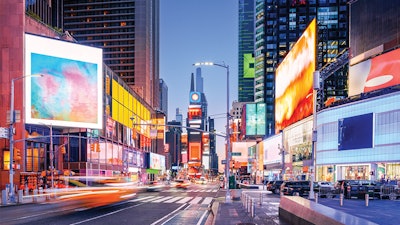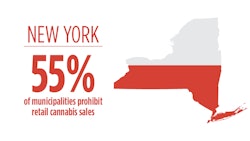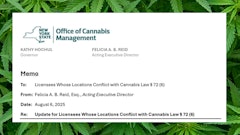
A class action lawsuit filed June 12 against the City of New York and several city officials claims the closure of hundreds of businesses under the SMOKEOUT Act is unconstitutional. Filed by attorney Lance Lazzaro of Lazzaro Law Firm, P.C., on behalf of more than two dozen businesses, the suit alleges that “sealing businesses, with no judicial review and without a court order, and based solely on the unadjudicated claim that a business was selling cannabis without a license” violates the Due Process Clause of the 14th Amendment.
“The execution and enforcement of the SMOKEOUT Act, by the Sheriff, with the limited administrative review by OATH [Office of Administrative Trials and Hearings], has resulted in the unconstitutional closure of hundreds of businesses, including the Plaintiffs, throughout New York City,” according to the lawsuit, which was filed against defendants: the City Of New York; Preston Niblack, Commissioner New York City Department Of Finance; New York City Sheriff Anthony Miranda; and Asim Rehman, commissioner of the New York City Office of Administrative Trials and Hearings (OATH).
Introduced by State Assemblywoman Jenifer Rajkumar, the SMOKEOUT Act (formally called the Stop Marijuana Over-proliferation and Keep Empty Operators of Unlicensed Transactions Act) allows New York State municipalities to close retailers selling cannabis without a license and to seize “the instrumentality of the unlawful sales, including real estate.” The act was passed in the state budget April 18, Rajkumar said in a statement.
New York Governor Kathy Hochul’s office issued a press release April 19 announcing the “new initiatives to shut down illicit cannabis operations and protect the legal marketplace as part of the FY25 Enacted Budget.”
"Unlicensed dispensaries have littered New York neighborhoods, blatantly circumventing our laws and selling potentially dangerous products,” Governor Hochul said in the announcement. “Enough is enough. I promised to protect our communities and hard-working, legal cannabis licensees by expediting the closure of illicit storefronts.”
The FY25 Budget gave “broad padlocking authority” to the Office of Cannabis Management (OCM), according to the press release. “OCM will be authorized to padlock businesses immediately following an inspection if they are selling illicit cannabis and pose an imminent threat to health and safety for the following reasons:
- Sales to minors
- Unlicensed processing of cannabis
- Violent conduct
- Presence of unlawful firearms
- Proximity to schools, houses of worship or public youth facilities
- Products leading to illness or hospitalization
- Products not tested or labeled according to NY Law”
Upon request, OCM must provide a hearing within 3 days, and a decision within 4 days after that.
New York cities and counties are also authorized to padlock unlicensed businesses.
New York City can “conduct administrative hearings within five days of execution of an emergency padlock order and will provide a decision within four days after the hearing,” the press release stated. Other municipalities must coordinate enforcement activities with OCM, and “they must require hearings in city or county courts within three days and decisions in four days following the hearing for locations that were padlocked at first inspection due to imminent harm.”
“I was proud to deliver a historic victory for the City of New York when my SMOKEOUT Act passed in the state budget,” Rajkumar said in a May 14 press release announcing the results of the first week of “Operation Padlock to Protect”—an enforcement action to close illegal smoke and cannabis shops operating in the city’s five boroughs. “Now, the city has the authority to use its full manpower to shut down illegal shops for good,” she said.
In that first week, the New York City Sheriff’s Joint Compliance Task Force “sealed 75 locations and issued nearly $6 million in penalties,” according to the press release.
By week three, 233 illegal smoke shops out of 2,800 hundred were shut down, with 65 permanently closed for at least a year, New York Police Department Chief of Patrol John Chell said during a community conversation hosted by New York City Mayor Eric Adams on May 28.
“We have seized over $6 million, estimated value, in illegal gummy bears, vapes, marijuana, mushrooms, you name it. Not to mention some illegal firearms,” said Chell. “That's in three weeks, and we really haven't got started yet because we're still working through the law. We're working through OATH court.”
Plaintiffs in the suit are: Plaintiffs Moon Rocket, Inc.; Exotics on Roosevelt, Corp.; Smoker’s World 1 Corp.; STZ Convenience Shop, Inc.; Smoke Base Convenience Store, Inc.; Big Apple Convenience 2, Corp.; Lush Convenience 161, Inc.; Empire City Shop, Inc.; Quick Smart Convenience, Corp.; Mother Gaston Gourmet Deli, Corp.; S & M Snacks, Corp.; 555 Deli, Corp.; Loud Pack NY, Corp.; 175 Grand Convenience, Corp.; Mao Shoppe, Corp.; 22 Convenient Shop, Corp.; 125 Red Eye, Inc.; Noise Pack, Corp.; Vanwyck Mini Market, Corp.; Omega Convenience, Inc.; Rush Hour Exotics, Corp.; 1452 Alpha, Inc.; General Zaza, LLC; 64 St. Convenience, Corp.; Moonshot Exotic Convenient, Corp.; Vegan Magic, Inc.; and First Choice Convenience, Corp.
They allege in the suit, which was filed in Southern New York District Court, that:
- “No judicial process is afforded before the Sheriff sealed businesses. No prior finding or adjudication, by any judge or court, takes place before the Sheriff closes a business. The Sheriff chooses to close a business based upon its own unilateral decision that a business was selling cannabis without a license and posed an imminent threat to the public’s health, safety, or welfare. While the closed business is given an administrative hearing before OATH within five business days of being closed by the Sheriff, the numerous hearing officers with OATH have issued inconsistent Decisions, and the Sheriff, regardless of OATH’s recommended Decision, still retains the sole decision-making authority as to whether the business will remain closed. The Due Process Clause does not permit the Sheriff to seal a business, without first seeking judicial review, based upon the Sheriff’s own unilateral finding that the business poses an imminent threat to the public’s health, safety, or welfare.
- The Due Process Clause further does not permit a business’s continued closure for one full year, after a limited administrative review before OATH, where the Sheriff ultimately makes a unilateral decision, needing only to consider but not follow OATH’s Hearing Officer’s recommendation, and there is still no judicial mechanism to examine the findings and decisions made by OATH or the Sheriff.
- The Sheriff has unlawfully sealed over two hundred businesses in the past five-to-six weeks, all in reliance upon the SMOKEOUT Act and sections 7-551 and 7-552 of the New York City Administrative Code. These widespread constitutional violations must stop, and Plaintiffs and the class members must be compensated for the significant monetary harm Defendants’ unconstitutional actions and practices have caused Plaintiffs and the class members to incur.

























